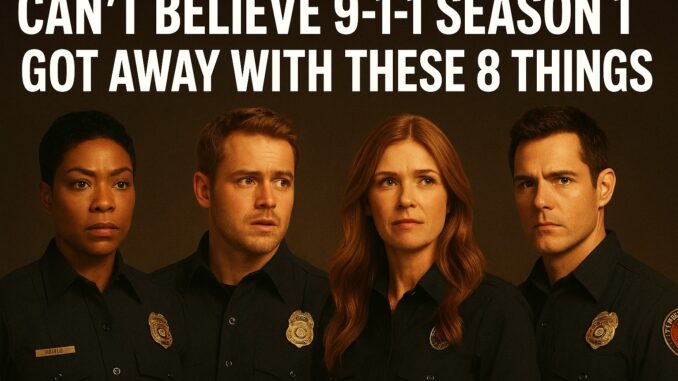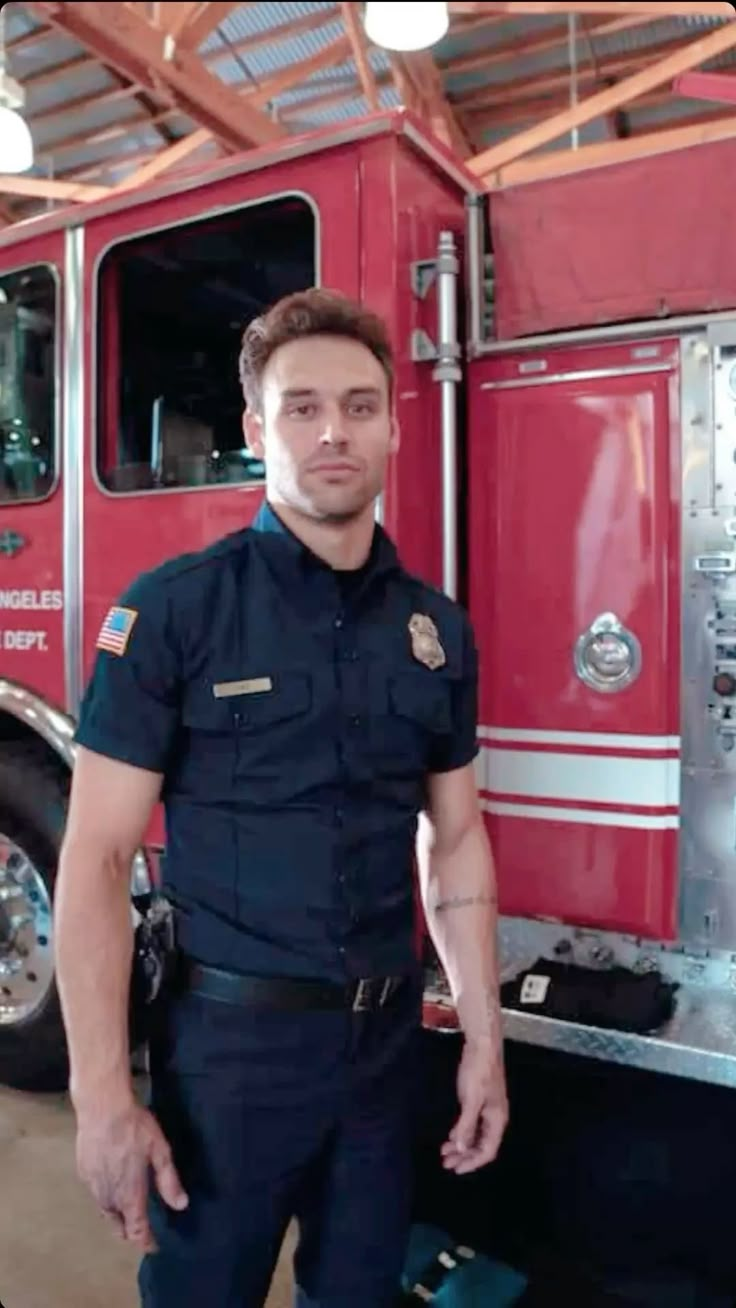
9-1-1 is infamously bizarre at times, but certain moments from season 1 are uncomfortable to look back on. From the start, a few winning elements set 9-1-1 up for success. The unique focus on multiple first-responder jobs, paired with big names like Angela Bassett (Athena Grant) and Peter Krause (Bobby Nash), helped get 9-1-1’s foot in the door at Fox.
Over the years, iconic aspects of the procedural have become tropes in and of themselves— like 9-1-1’s near-death experiences, often ironic needle-drops, and blend of easy humor and whiplash-inducing drama. While some 9-1-1 episodes are considered masterpieces, it’s widely believed season 1 is by far the weakest year in 9-1-1’s entire run— and upon a rewatch, it’s abundantly clear why.
After eight seasons, LAFD Station 118 has become far more than a firehouse. The found family element in 9-1-1 is what drew many viewers in, with the tight-knit relationships providing ample comfort in the face of earth-shattering emergencies. Yet, the core team of firefighters in 9-1-1 season 1 weren’t even on friendly terms until the final few episodes.
Bobby eventually became a father figure for everyone in the 118, but his early dynamics with Evan “Buck” Buckley (Oliver Stark), Howard “Chimney” Han (Kenneth Choi), and Hen Wilson (Aisha Hinds) were far from paternal. Between Buck’s behavior in the pilot episode and Chimney providing snark instead of comic relief, the LAFD dream team was originally filled with animosity.
When 9-1-1 first premiered in 2018, it instantly grabbed attention with its mix of intense rescues, raw human drama, and storylines that felt ripped from real life. But looking back now, fans can’t believe some of the wild, questionable, and downright jaw-dropping things the show got away with in Season 1.
From over-the-top emergencies to risky storylines, the series pushed boundaries in ways that made people gasp, laugh, or even cringe. Let’s dive into the eight moments that prove 9-1-1’s first season was one of the boldest in TV drama history.
The Legacy of 9-1-1 Season 1
Before we break down the moments, let’s take a step back. 9-1-1 wasn’t just another procedural drama—it was a reinvention of the genre. The show mixed life-threatening emergencies with personal struggles, giving us heroes who were flawed, relatable, and messy. But in trying to hook viewers, Season 1 also took some risks that wouldn’t slide so easily today.
1. The Infamous Snake in the Toilet Scene
Remember that horrifying moment when a snake slithered up through a toilet and nearly bit a victim? Yes, it actually happened in Season 1. While it was based on real-life headlines, the execution was so over-the-top that it had people laughing as much as screaming. Critics argued it was pure shock value, but fans couldn’t stop talking about it.
2. Abby’s Questionable Relationship Storyline
Abby Clark, the 911 operator played by Connie Britton, had one of the most controversial arcs of the season. Her romance with Buck—a much younger firefighter—raised eyebrows. Viewers debated whether it was empowering, messy, or just uncomfortable. Today, a storyline like that would face way more online backlash.
3. The Roller Coaster Rescue
One of the wildest rescues in Season 1 was the roller coaster disaster. Sure, it was thrilling to watch, but some viewers called it unnecessarily dramatic and unrealistic. Did we really need a heart-pounding theme park accident that big, that early in the series? Apparently, yes—because it worked.
4. Buck’s Reckless Behavior
Evan “Buck” Buckley was introduced as the reckless playboy firefighter, and honestly, some of the stuff he pulled in Season 1 would never fly today. From hooking up on the job to breaking rules left and right, Buck was basically a lawsuit waiting to happen. Yet fans loved him anyway, proving that chaos sometimes makes the best TV.
5. The Airplane Baby Delivery
If you thought things couldn’t get crazier, Season 1 gave us a woman going into labor mid-flight. Sure, birth emergencies make for dramatic TV, but on an airplane thousands of feet in the air? It stretched believability to its limits. Still, it was one of the most talked-about moments of the season.
6. Maddie’s Storyline Foreshadowed (Too Soon)
Though Maddie (Jennifer Love Hewitt) officially joined later, Season 1 planted subtle foreshadowing about future domestic abuse themes. While powerful, the handling of such sensitive topics felt rushed at times. Fans applauded the show for bravery but criticized it for not giving the storyline enough breathing room early on.
7. The Creepy Babysitter Episode
One of the darkest cases in Season 1 involved a babysitter who wasn’t exactly what she seemed. It pushed the line between dramatic TV and exploitative storytelling. Viewers were divided—some thought it was gripping, while others found it disturbing for prime-time TV.
8. The Overloaded Season Finale
Season 1 ended with a finale that crammed in everything—fires, rescues, relationship drama, and emotional cliffhangers. While exciting, critics argued it was too much too soon. It felt like the writers were afraid viewers wouldn’t return unless they packed in every possible dramatic twist.
Why Season 1 Still Works Despite the Risks
So why did 9-1-1 Season 1 get away with all of this? Because it was fresh, daring, and unapologetically wild. The writers weren’t afraid to take risks, and audiences were hooked by the unpredictability. In many ways, these “questionable” choices are what made the show stand out from a crowded field of procedural dramas.
The Balance Between Realism and Entertainment
One thing Season 1 nailed was mixing believable rescues with outrageous scenarios. Yes, snakes in toilets and roller coaster crashes were wild, but they kept viewers guessing—and tuning in week after week.
Characters Fans Couldn’t Ignore
Even when the storylines felt overblown, the characters kept us grounded. Buck’s reckless charm, Abby’s struggles, Athena’s commanding presence—Season 1 introduced a cast that felt human, flawed, and worth rooting for.

A Formula That Sparked a Franchise
If Season 1 had played it too safe, 9-1-1 might not have become the franchise it is today, with spin-offs like 9-1-1: Lone Star. The risks paid off, because people were talking—and in television, buzz is everything.
Lessons Other Shows Can Learn
-
Don’t be afraid of bold storytelling.
-
Controversy can fuel conversation (and ratings).
-
Strong characters can carry even the most outlandish plots.
Final Thoughts
Looking back, 9-1-1 Season 1 feels like controlled chaos. Some storylines would never fly today, but at the time, they set the stage for one of TV’s most addictive dramas. Love it or hate it, Season 1 proved that sometimes you need to push the envelope to stand out.
Conclusion
9-1-1 Season 1 was bold, messy, and unforgettable. It got away with things that would spark think pieces and Twitter storms today, but that’s exactly why it worked. The show didn’t play it safe—it dared to shock, entertain, and even frustrate us. And that’s why we’re still talking about it years later.
